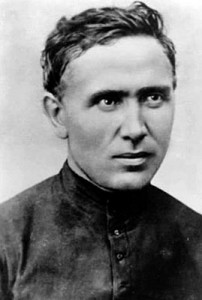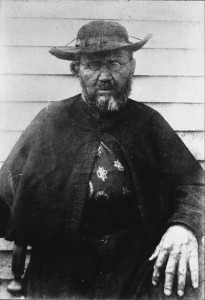Last year, I told you I watched Groundhog Day for the first time. One thing that stood out for me is the reason Bill Murray’s character falls in love with Andie MacDowell’s. When they’re in a diner, he tells her everything he knows about her, including what he appreciates about her: “You’re wonderfully generous; you’re kind to strangers and children; and when you stand in the snow, you look like an angel.”
(See 2:22)
What kind of spouse do we want our children to marry? Wouldn’t it be great if we could say they married someone who is kind to strangers and children?
One time, I was part of a group of priests evaluating seminarians to see who was ready to be ordained a priest. Talking about one seminarian, a priest said the trait that stood out for him during this seminarian’s summer assignment was that he always tried to include other people. When I heard this, I thought, “Yes! That’s it! That’s kind of priest we need! That’s one of the defining characteristics of a virtuous person! He scans a room and sees who’s not included and then goes over and brings them in!” I can’t tell you how insightful that was for me, because it described something I’ve always known to be an amazing quality.
The word that describes people like this is magnanimous, which literally means in Latin, big heart. And the person who has the biggest heart in the world is Jesus! And then Mary, and then all the saints.
Today, Jesus tells us what kind of friend/follower He wants: He wants people like Him. He asks St. Peter three times, “Do you love me?” Each time he answers, “Yes,” Jesus then gives him a command, “Feed my sheep.” There’s a connection between loving Jesus and other people. If we love Jesus, then we have to love all people. Like last week, we talked about how love is outward-focused; we have to get out there and think about other people! Jesus says, “Truly, I say to you, as you did it to one of the least of these my brethren, you did it to me” (Mt 25:40). “A new commandment I give to you, that you love one another; even as I have loved you, that you also love one another. By this all men will know that you are my disciples, if you have love for one another” (Jn 13:34-35).
When I was praying over today’s Gospel, I had this intense desire to be close to Jesus, to have an intimate relationship with Him the way St. John the Apostle, the writer of this Gospel, had. But then I realized that I don’t have a big heart. I love Jesus, I love people I like, I love you, but I don’t love everyone. And so I don’t love Jesus completely. Our ability to love God is linked to our ability to love others, because it has to do with our capacity to love. If we’re closed off to God, then we’re closed off to others. If we’re closed off to others, we’re closed off to God.
Two things happened to me during the time I was writing this homily showing me that I need to have a bigger heart: 1) Literally while praying over these readings and wanting to have a deeper relationship with Jesus, I received an emergency call to visit a sick person. Right after I hung up and waited for the return call, I went back to prayer and prayed over the next line: “Feed my sheep.” I realized that if I really want a deeper relationship with Jesus, I have to expand my heart and love the person who just called even though I don’t know them. I said to Jesus right then, “Okay, got the message! I choose to love them.” 2) During the week I was writing this homily, I read that Project Advance overall surpassed its goal of $7 million, and I thought internally, “So?” I had this reaction because, while a part of me cares about the archdiocese, a part of me isn’t as concerned as a should be. If I had had a big heart, I would have said, “That’s great!” I would have been happy that they (we) had achieved their (our) goal.
How did we react when we saw the Project Advance video? Did we say, “So?” meaning “This doesn’t affect me.” Or do we have a big heart and share in other people’s joy?
Imagine for a moment: if there were a leper colony on Salt Spring Island and Archbishop Miller asked if anyone would go there to minister to them, the first question would be, “Do we care?” What’s going on in our hearts? Are we moved by their suffering? Do we want to help? Second question, would we get involved?
 When the bishop in Hawaii asked for volunteers, a 33-year-old priest from Belgium named Damien De Veuster volunteered, knowing he would die. Even though he tried to avoid contracting the disease, he eventually got it and his whole body was disfigured and he served among the people for 16 years until he died. Wow! He had such a big heart. He’s now Saint Damien of Molokai. This is one of the qualities we look for in future priests: they get out of their shell and take care of other people.
When the bishop in Hawaii asked for volunteers, a 33-year-old priest from Belgium named Damien De Veuster volunteered, knowing he would die. Even though he tried to avoid contracting the disease, he eventually got it and his whole body was disfigured and he served among the people for 16 years until he died. Wow! He had such a big heart. He’s now Saint Damien of Molokai. This is one of the qualities we look for in future priests: they get out of their shell and take care of other people.
Let’s pray for a bigger heart, to have Jesus’ heart. There are two things I would like everyone to specifically ponder and work on. 1) Please love each other and take care of each other here at St. Anthony’s. I’m not asking that we all have warm, fuzzy feelings for each person—that’s impossible. But I’m asking that at least we be concerned for each other. The people sitting next to us are our brothers and sisters. Please learn their names, get to know each other, look out for each other. It’s not a sign of love when we come to church and leave without interacting with other people. Keeping to ourselves is not a virtue, not the attitude of Christ. We talked last week about the health of our parish. One measure of health is to see how we love each other and we need everyone to contribute to this, please. 2) Let’s extend our love outside our parish by supporting Project Advance, a fundraiser designed to help us and others. We’re donating all the extra money to our parish centre project, which will also serve as the gym for the students. While we’ve kept our parish goal the same this year, I’m asking that everyone participate and that the participation rate goes up because participation is a sign that we care. We might not personally get anything out of the parish centre, but that’s okay, because it will help the people we care for! That’s awesome!
Whatever kind of people you want your children to marry, then be that person yourself! I want parishioners who would care about people dying of disease or suffering in war-torn countries, so I will be that person too.
Just to finish off: In Groundhog Day, Bill Murray’s character starts off thinking mainly of himself: his own needs and wants, doing what will make him happy. This leads to misery and despair. Over time, he works on bettering himself and living entirely for other people. In his final day, we see all his Good-Samaritan efforts come together: saving a boy falling out of a tree, changing some ladies’ flat tire, giving a young couple tickets to a wrestling match, saving a man from choking, supporting an insurance man by buying insurance—entirely selfless. Over time, we should all grow in this way. We’re meant to become like Jesus, magnanimous.